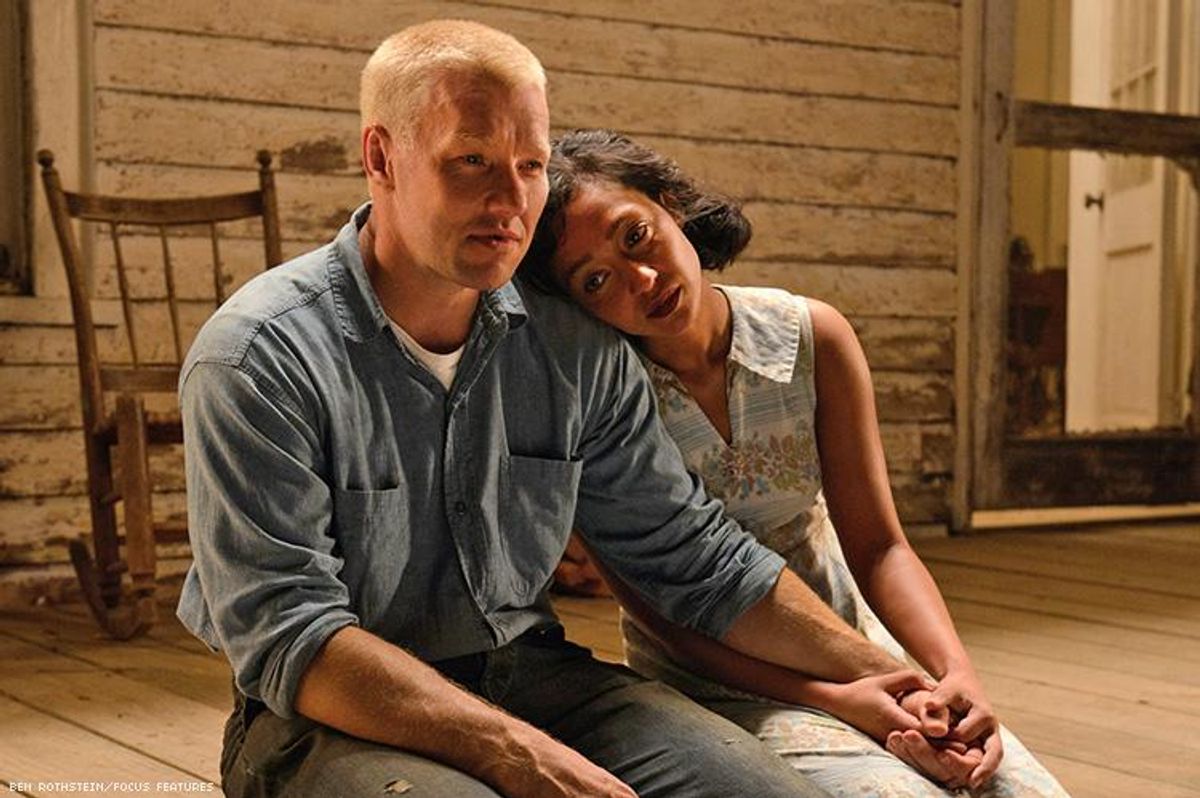Jeff Nichols, the director and screenwriter of Loving, sees direct parallels between the struggle of an opposite-sex interracial couple and the continuing worldwide battle for marriage equality.
Loving, which comes out November 4, tells the story of Mildred and Richard Loving of Virginia, a couple forced to marry in Washington D.C., because it was illegal for whites and blacks to marry in Virginia in 1958. Once back home in Virginia, police raided their house at night and arrested them for violating the state's miscegenation laws. The Lovings took their struggle for equal rights all the way to the Supreme Court, where anti-miscegenation laws were ruled unconstitutional in Loving v. Virginia.
Decades later, Nichols remembers being upset that his best friend could not marry his boyfriend in Arkansas because same-sex marriage was not legal in his native state nor in his boyfriend's native Texas.
Nichols's best friend eventually wed his husband in upstate New York, where same-sex marriage became legal in 2011. But Nichols, who was the best man at the wedding, remembers being furious because the grooms were not allowed the same rights straight Americans have. Nichols had just married his wife a few years before without having to escape to a state that recognized his relationship.
"It was the first time that I had a real personal connection to the issue and I think it bothered me more than it did him," Nichols told The Advocate.
Loving v. Virginia was a landmark case not only for interracial couples, but also for same-sex couples. The case was used as precedent in Obergefell v. Hodges, the 2015 Supreme Court ruling that legalized same-sex marriage across the nation.
Even with same-sex marriage legal, 37 percent of Americans wish it wasn't. Kim Davis is the most egregious example of continuing antigay attitudes; the Kentucky clerk refused to sign a marriage license for same-sex couples last year and ignited a media storm. A year later, Davis continues to stick to her claim that same-sex couples do not deserve the right to marry. Meanwhile, same-sex couples from Australia to Italy are still fighting for their rights.
Back home, the Republican party clings to marriage equality resistance. Donald Trump, the GOP nominee, does not support it, and former candidate Ted Cruz assured his constituency he would repeal the high court ruling if he was elected president.
Australian actor Joel Edgerton, who plays Richard Loving in the new film, told The Advocate he couldn't help seeing comparisons to his own country. "I'm incredibly proud of my country and I love it to bits, but this is a very shameful thing," Edgerton said about the nation's resistance to marriage equality.
Ruth Negga, who plays Mildred Loving, says she also was proud of her native Ireland, which passed marriage equality last year. Negga, the child of interracial parents, said that she hopes people who watch the film recognize our common humanity.
"It will humanize people who actually don't think are like them. They think, 'Oh, we're different, we're not the same,' and this film shows that we are. We have so much more in common than we are led to believe," Negga told The Advocate.
When marriage equality became the law of the land, Mildred Loving released a supportive statement:
"Surrounded as I am now by wonderful children and grandchildren, not a day goes by that I don't think of Richard and our love, our right to marry, and how much it meant to me to have that freedom to marry the person precious to me, even if others thought he was the 'wrong kind of person' for me to marry," Loving, who would pass away soon after, wrote. "I believe all Americans, no matter their race, no matter their sex, no matter their sexual orientation, should have that same freedom to marry."
Not everyone, including Supreme Court justices, sees a direct connection between the Loving case and Obergefell. Four justices considered the passing of marriage equality to be a "dangerous thing."
Justice Clarence Thomas, who is in an interracial marriage, voted against marriage equality. In his dissenting opinion, Thomas said marriage equality put religious freedom at risk.
"Slaves did not lose their dignity (any more than they lost their humanity) because the government allowed them to be enslaved. Those held in internment camps did not lose their dignity because the government confined them. And those denied governmental benefits certainly do not lose their dignity because the government denies them those benefits. The government cannot bestow dignity, and it cannot take it away," Thomas wrote.
Nichols says he knew from the beginning there would be a connection between the Loving and Obergefell cases. "We knew there would be connections and we wanted there to be connections, because at the end of the day its not simply about their race, its about the fact that two people were at the center of a divisive issue," Nichols said.
People should understand that "there's hardship at the center" of the struggle the Lovings faced, and the struggle LGBT people faced. "We should face the hardship, we should understand what created it, but we should also not lose sight of the fact that there were people at the heart of it; people that cared for one another and loved one another."
Loving opens in theatres November 4.
Watch a trailer of the film below.

















































































Viral post saying Republicans 'have two daddies now' has MAGA hot and bothered